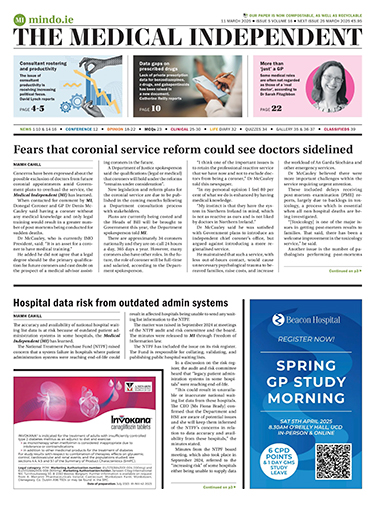Today on International Women’s Day, the Medical Council is publishing its 2022 workforce intelligence report.
The data shows the growing number of female doctors registering with the Medical Council for the first time and provides insights as to why doctors chose to withdraw from the register in 2022.
The number of doctors on the register has been increasing year on year, with the number of young female doctors having risen steadily over the past decade.
Key data highlights from the report include:
First Time Registered Doctors:
- 3,008 doctors registered with the Medical Council for the first time in 2022, compared with 2,605 in the previous year, representing a 15 per cent increase.
- Over half (52.6 per cent) of doctors registering for the first time in 2022 were male, and 47.4 per cent were female.
- Notably, the ratio of females to males is greater in the youngest cohort of doctors, aged 24 and younger (45 per cent male vs 55 per cent female).
- Furthermore, 71.2 per cent of doctors registering for the first time obtained their qualifications abroad.
Doctors Retaining Registration:
- 18,839 (81.5 per cent) doctors who renewed their registration with the Medical Council were clinically active in Ireland, all or some of the time in 2022.
- In 2022, 46.8 per cent of clinically active doctors in Ireland were female, while 53.2 per cent were male. The distribution of males and females was split more evenly in younger cohorts, whereas the majority of older doctors are male. Over half (51.7 per cent) of clinically active doctors working in Ireland were on the specialist division of the register, 16.3 per cent of doctors were on the trainee division; and 31.2 per cent were on the general division.
- Over a quarter of clinically active doctors working in Ireland self-reported working more than 48 hours a week on average. Of concern, over half of all trainees reported working more than 48 hours per week on average.
- 1,341 doctors, of whom 593 were female, voluntarily withdrew their registration with the Medical Council. Among doctors who completed the voluntary withdrawal survey, 45.9 per cent offered detailed explanations on the reasons for withdrawing their registration. A number of work-related issues were cited, including limited career progression and training opportunities, poor working conditions, personal or family reasons, plans to practise abroad, and other reasons such as registration requirements and the emergency response to Covid-19 coming to an end.
President of the Medical Council, Dr Suzanne Crowe, said: “As the world collectively celebrates International Women’s Day, I’m glad to see a rising number of women in medicine in Ireland, particularly those aged 24 and under. In 1994, women made up just 30 per cent of the medical register. Now, 30 years later, we are nearly at a 50/50 split male to female, with the numbers of female doctors in the younger age cohorts outpacing male doctors.”
“Over the years, there has been a significant increase in the representation of women within the medical profession, reflecting a positive shift towards greater gender diversity and inclusivity in healthcare.”
Dr Crowe said one of the key themes of this year’s International Women’s Day is promoting diversity in leadership and decision-making positions.
“Women, especially those belonging to underrepresented groups, continue to face barriers when seeking leadership roles,” she commented. “Today, I’m also reflecting on the contributions of the women who tirelessly advocate for patients and vulnerable people in Ireland. Today, we celebrate their dedication, compassion, and commitment to making a positive difference in the lives of others. Women can bring a unique understanding of women’s health issues, paving the way for change in medicine, and helping other patients to feel safe and heard.”
Support
Dr Crowe noted that doctors who withdrew from the register in 2022 often cited personal and wellbeing-related reasons for deciding not to retain their registration.
“Balancing caring duties at home with onerous rosters and poor access to childcare is a major issue for doctors, especially those in training. Supports are available to doctors, and we must come together to support our colleagues who may be struggling. Just like everyone else, doctors can also fall ill or experience times of poor mental health.”
Ms Jantze Cotter, Executive Director, Regulatory Policy and Standards, Medical Council, added: “We must do all in our power to retain our highly skilled medical workforce. A key aspect of this is organisations working together, using data, knowledge, and resources to focus efforts and produce tangible actions.
“The recently released National Taskforce on the Non-Consultant Hospital Doctor Workforce report outlines key recommendations that require cross partner work to address identified issues. This includes recalibrating work-life balance through improved rosters, reduced work hours, flexible rotations and childcare.”
Dr Bernadette Rock, Head of Research, Medical Council, noted: “The evidence collected through Medical Council surveys is analysed and reported to key health organisations to support workforce planning. It’s great to see this data being utilised by organisations such as the National Doctors training programme, as it shows the power of the voice of doctors in influencing change.”
The Medical Workforce Intelligence Report for 2023 will be published later this year.
The 2022 report is available here: https://www.medicalcouncil.ie/news-and-publications/reports/2022-medical-workforce-intelligence-consolidated-report.pdf













Leave a Reply
You must be logged in to post a comment.